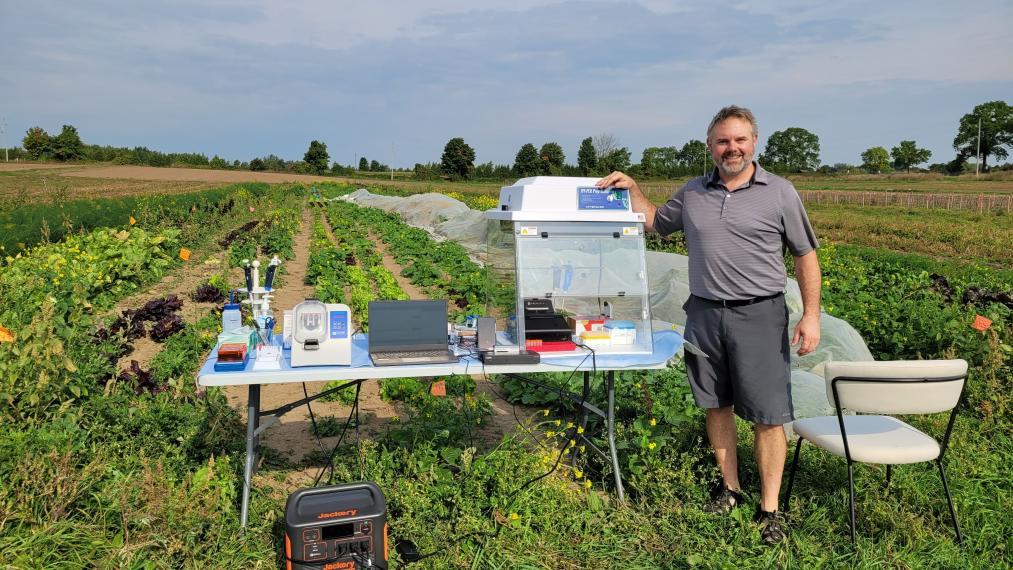Harvest Genomics: Picking up the pace of genetic progress

Chris Grainger is living a DNA dream. He’s channelling his passion for integrating genetic technology with practical applications to create innovative products for Canada’s agri-food industry.
After more than 20 years in varied roles at the University of Guelph, Grainger co-founded Harvest Genomics in 2019. The new ag-tech start-up based in Guelph develops and deploys genomic technology for food development and food safety.
A win in the 2020 Gryphon’s LAAIR (Leading to the Accelerated Adoption of Innovative Research) pitch competition during the COVID-19 pandemic helped to launch the company. Since then, Harvest Genomics has introduced three innovative products into the Ontario and Quebec markets.
“The COVID-19 pandemic provided a short course on a global level about genetic testing, introducing common phrases and jargon that have really helped us explain what our company does,” says Grainger, who is also the company’s CEO.
For many people, PCR and “rapid testing” became familiar terms during the pandemic. Besides their use in health, these techniques are among the many unique services Harvest Genomics now offers.
As well, the company’s work echoes the popularity of services like ancestry.com and 23andme, says Grainger. “We use the same technology as DNA testing for ancestry inquiries, but we are sequencing the genetic info of crops to help make faster advances in the market.”
Accelerating exposure
Shortly after Harvest Genomics opened, it received the grand prize in the Gryphon’s LAAIR pitch competition in 2020. Here again, the pandemic inadvertently helped build awareness.
Held virtually, the competition attracted nearly five times the audience of previous in-person events, exposing Harvest Genomics to a broader, more diverse market.
“The Gryphon’s LAAIR event was a great connector and accelerator for our business that offered a way for us to quickly make connections with government, academia and industry,” says Grainger. “It was really the springboard to get us going.”
An impressive lineup
Since then, Harvest Genomics has been busy developing, commercializing and launching three innovative flagship products.
First, the company offers herbicide resistance testing for weeds in field crops in Ontario and Quebec. The testing is now done in a lab, but the company is looking at quick, field-side testing as with rapid home tests for COVID.
A second product is a sequencing-based test used by greenhouse tomato growers in Ontario to detect tomato brown rugose fruit virus. The test is the first of its kind in Canada, says Grainger.
“The technologies required for the type of testing we do are now portable and miniaturized, and we are testing a pop-up mobile lab as a way to deliver a full range of tests on location in controlled environments like a greenhouse.”
A third product for the seed industry in Ontario and Quebec is intended to help bring new crop varieties to market sooner. “I work with many plant breeders in smaller seed companies to help them develop new crops with new genetics to help mitigate the effects of climate change and more extreme weather events as well as pathogens,” he says.
Faster testing and decision making
Every Harvest Genomics product is designed to provide more timely information for users to make better decisions, says Grainger.
“Our technology offers a full range of options, whether you want a quick, inexpensive PCR-based test or you need full-scale genome sequencing. We can literally use this technology to offer solutions in any crop setting.”
The company is currently focusing on Ontario and Quebec where it operates laboratory facilities. Grainger is eyeing future expansion to seed breeding services, especially for countries that lack the technologies available in Canada.
The Gryphon’s LAAIR program is funded by the Ontario Agri-Food Innovation Alliance, a collaboration between the Ontario Ministry of Agriculture, Food and Rural Affairs and the University of Guelph.
The program supports the commercialization of research findings for the Ontario agri-food sector. In addition to funding the pitch event, the program provides grants to help researchers identify target markets and test concepts with industry and consumers.